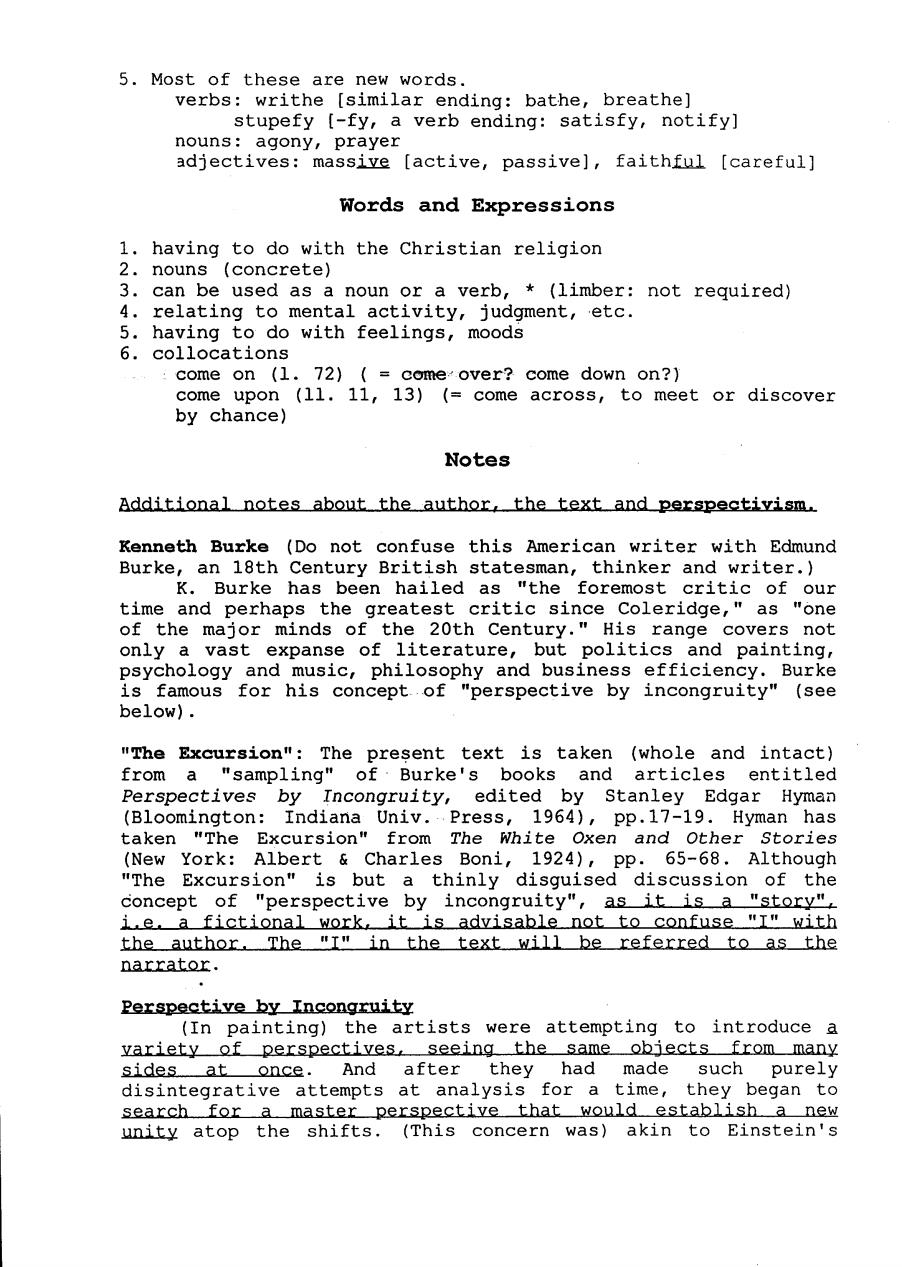
5.Most of these are new words. verbs:writhe [similar ending:bathe,breathe] stupefy [-fy,a verb ending:satisfy,notify] nouns:agony,prayer adjectives:massive [active,passive],faithful [careful] Words and Expressions 1.having to do with the Christian religion 2.nouns (concrete) 3.can be used as a noun or a verb,(limber:not required) 4. relating to mental activity,judgment,etc. 5.having to do with feelings,moods 6. collocations come on (1.72)(=comeover?come down on?) come upon (11.11,13)(=come across,to meet or discover by chance) Notes Additional notes about the author.the text and perspectivism. Kenneth Burke (Do not confuse this American writer with Edmund Burke,an 18th Century British statesman,thinker and writer.) K.Burke has been hailed as "the foremost critic of our time and perhaps the greatest critic since Coleridge,"as "one of the major minds of the 20th Century."His range covers not only a vast expanse of literature,but politics and painting, psychology and music,philosophy and business efficiency.Burke is famous for his concept..of "perspective by incongruity"(see below). "The Excursion":The present text is taken (whole and intact) from a "sampling"of Burke's books and articles entitled Perspectives by Incongruity,edited by Stanley Edgar Hyman (Bloomington:Indiana Univ.Press,1964),pp.17-19.Hyman has taken "The Excursion"from The White Oxen and Other Stories (New York:Albert Charles Boni,1924),pp.65-68.Although "The Excursion"is but a thinly disguised discussion of the concept of "perspective by incongruity",as it is a "story" ie a fictional work,it is advisable not to confuse "I"with the author.The "I"in the text will be referred to as the narrator. Perspective by Incongruity (In painting)the artists were attempting to introduce a variety of perspectives.seeing the same objects from many sidesat once.And after they had made such purely disintegrative attempts at analysis for a time,they began to search for a master perspective that would establish a new unity atop the shifts.(This concern was)akin to Einstein's
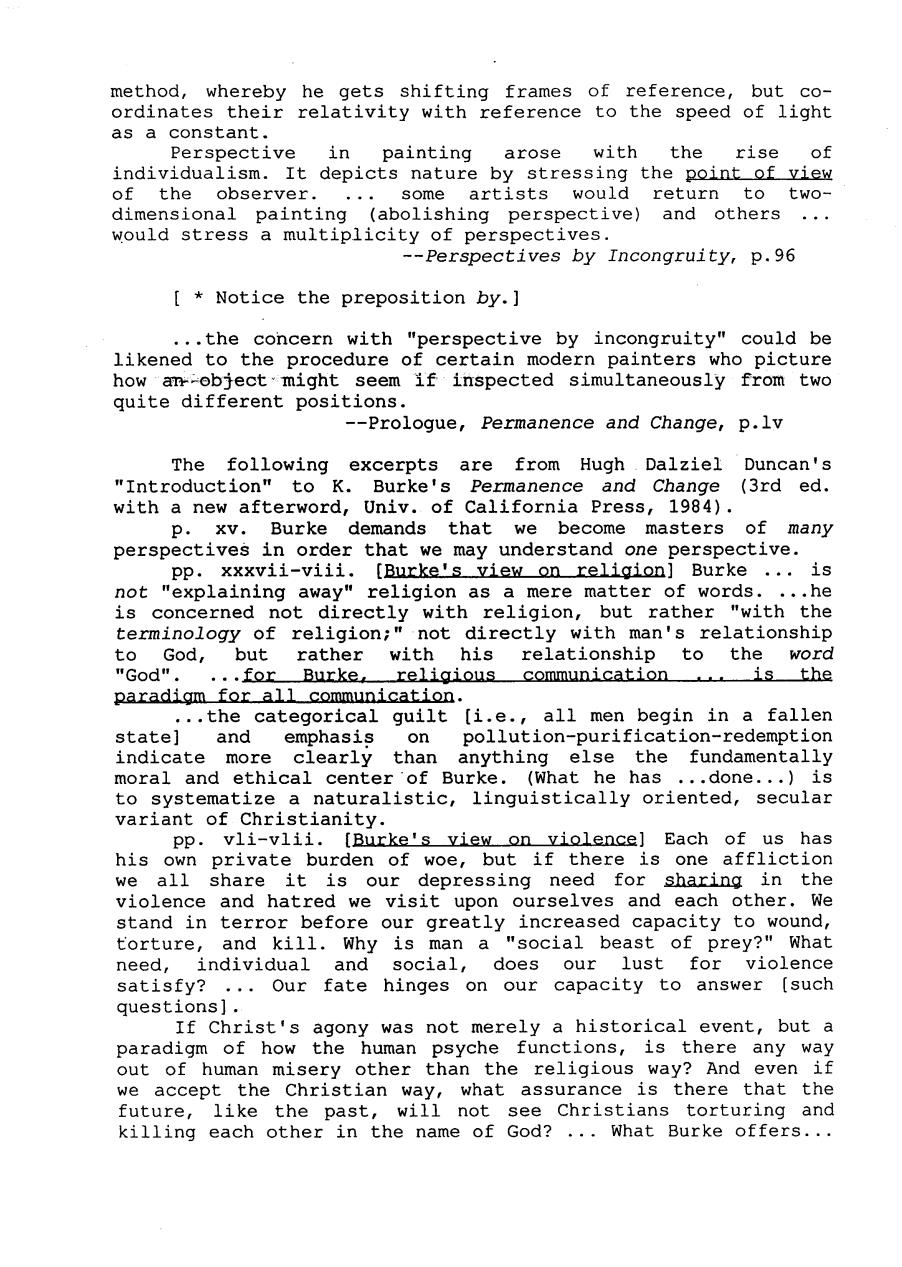
method,whereby he gets shifting frames of reference,but co- ordinates their relativity with reference to the speed of light as a constant. Perspective in painting arose with the rise of individualism.It depicts nature by stressing the point of view of the observer....some artists would return to two- dimensional painting (abolishing perspective)and others .. would stress a multiplicity of perspectives. --Perspectives by Incongruity,p.96 Notice the preposition by. ...the concern with "perspective by incongruity"could be likened to the procedure of certain modern painters who picture how an--object might seem if inspected simultaneously from two quite different positions. --Prologue,Permanence and Change,p.Iv The following excerpts are from Hugh.Dalziel Duncan's "Introduction"to K.Burke's Permanence and Change (3rd ed. with a new afterword,Univ.of California Press,1984). p.xv.Burke demands that we become masters of many perspectives in order that we may understand one perspective. pp.xxxvii-viii.[Burke's view on religion]Burke ..is not "explaining away"religion as a mere matter of words....he is concerned not directly with religion,but rather "with the terminology of religion;"not directly with man's relationship to God,but rather with his relationship to the word "God"....for Burke religious communication is the paradigm for all communication. ..the categorical guilt [i.e.,all men begin in a fallen state]and emphasis on pollution-purification-redemption indicate more clearly than anything else the fundamentally moral and ethical center'of Burke.(What he has ...done...)is to systematize a naturalistic,linguistically oriented,secular variant of Christianity. pp.vli-vlii.[Burke's yiew on violence]Each of us has his own private burden of woe,but if there is one affliction we all share it is our depressing need for sharing in the violence and hatred we visit upon ourselves and each other.We stand in terror before our greatly increased capacity to wound, torture,and kill.Why is man a "social beast of prey?"What need,individual and social,does our lust for violence satisfy?..Our fate hinges on our capacity to answer (such questions]. If Christ's agony was not merely a historical event,but a paradigm of how the human psyche functions,is there any way out of human misery other than the religious way?And even if we accept the Christian way,what assurance is there that the future,like the past,will not see Christians torturing and killing each other in the name of God?..What Burke offers
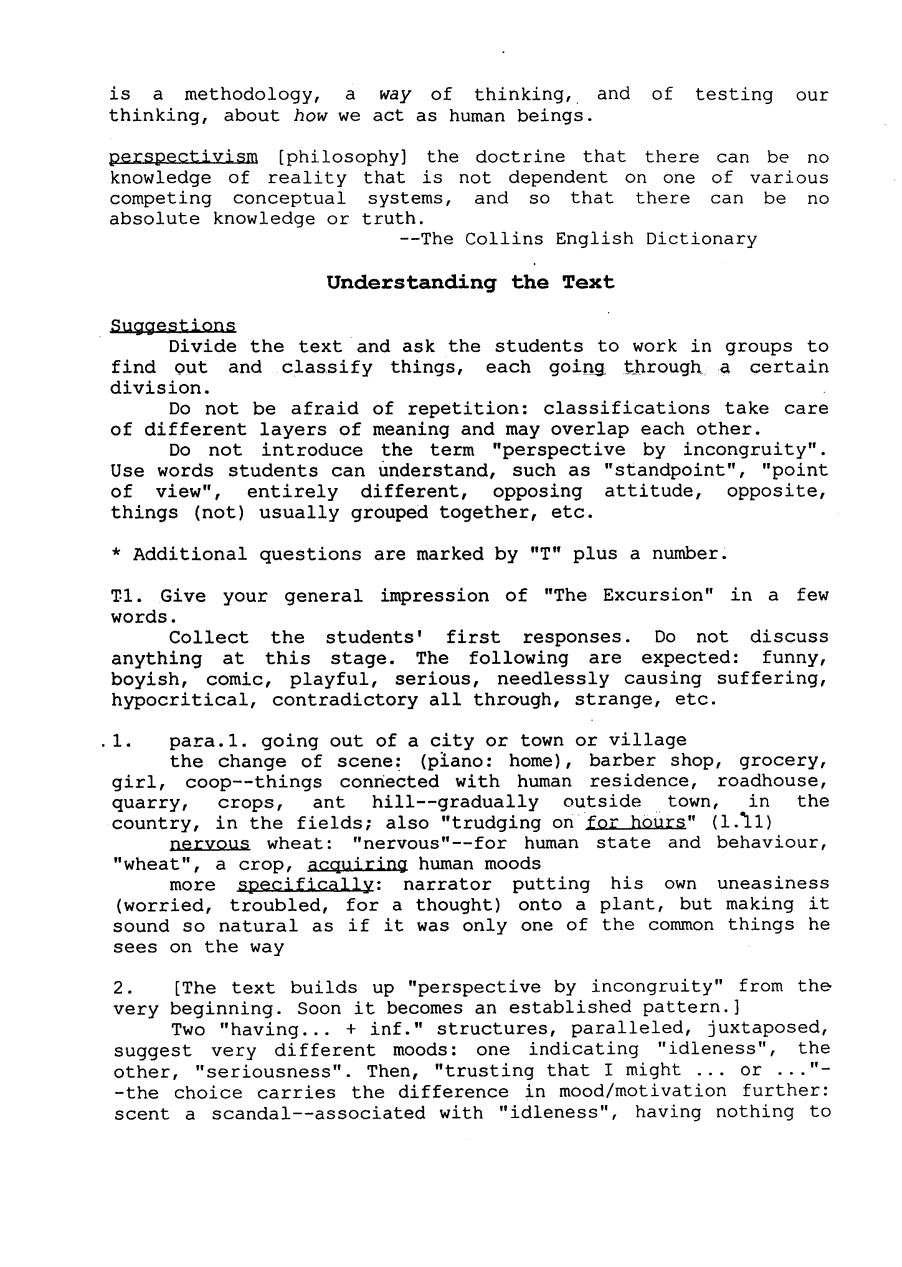
is a methodology,a way of thinking,and of testing our thinking,about how we act as human beings. perspectivism [philosophy]the doctrine that there can be no knowledge of reality that is not dependent on one of various competing conceptual systems,and so that there can be no absolute knowledge or truth. --The Collins English Dictionary Understanding the Text Suggestions Divide the text and ask the students to work in groups to find out and classify things,each going through a certain division. Do not be afraid of repetition:classifications take care of different layers of meaning and may overlap each other. Do not introduce the term "perspective by incongruity". Use words students can understand,such as "standpoint","point of view",entirely different,opposing attitude,opposite, things (not)usually grouped together,etc. Additional questions are marked by "T"plus a number. T1.Give your general impression of "The Excursion"in a few words. Collect the students'first responses.Do not discuss anything at this stage.The following are expected:funny, boyish,comic,playful,serious,needlessly causing suffering, hypocritical,contradictory all through,strange,etc. .1. para.1.going out of a city or town or village the change of scene:(piano:home),barber shop,grocery, girl,coop--things connected with human residence,roadhouse, quarry,crops,ant hill--gradually outside town,in the country,in the fields;also "trudging on for hours"(1.11) neryous wheat:"nervous"--for human state and behaviour, "wheat",a crop,acquiring human moods more specifically:narrator putting his own uneasiness (worried,troubled,for a thought)onto a plant,but making it sound so natural as if it was only one of the common things he sees on the way 2. [The text builds up "perspective by incongruity"from the very beginning.Soon it becomes an established pattern. Two "having...+inf."structures,paralleled,juxtaposed, suggest very different moods:one indicating "idleness",the other,"seriousness".Then,"trusting that I might...or..."- -the choice carries the difference in mood/motivation further: scent a scandal--associated with "idleness",having nothing to
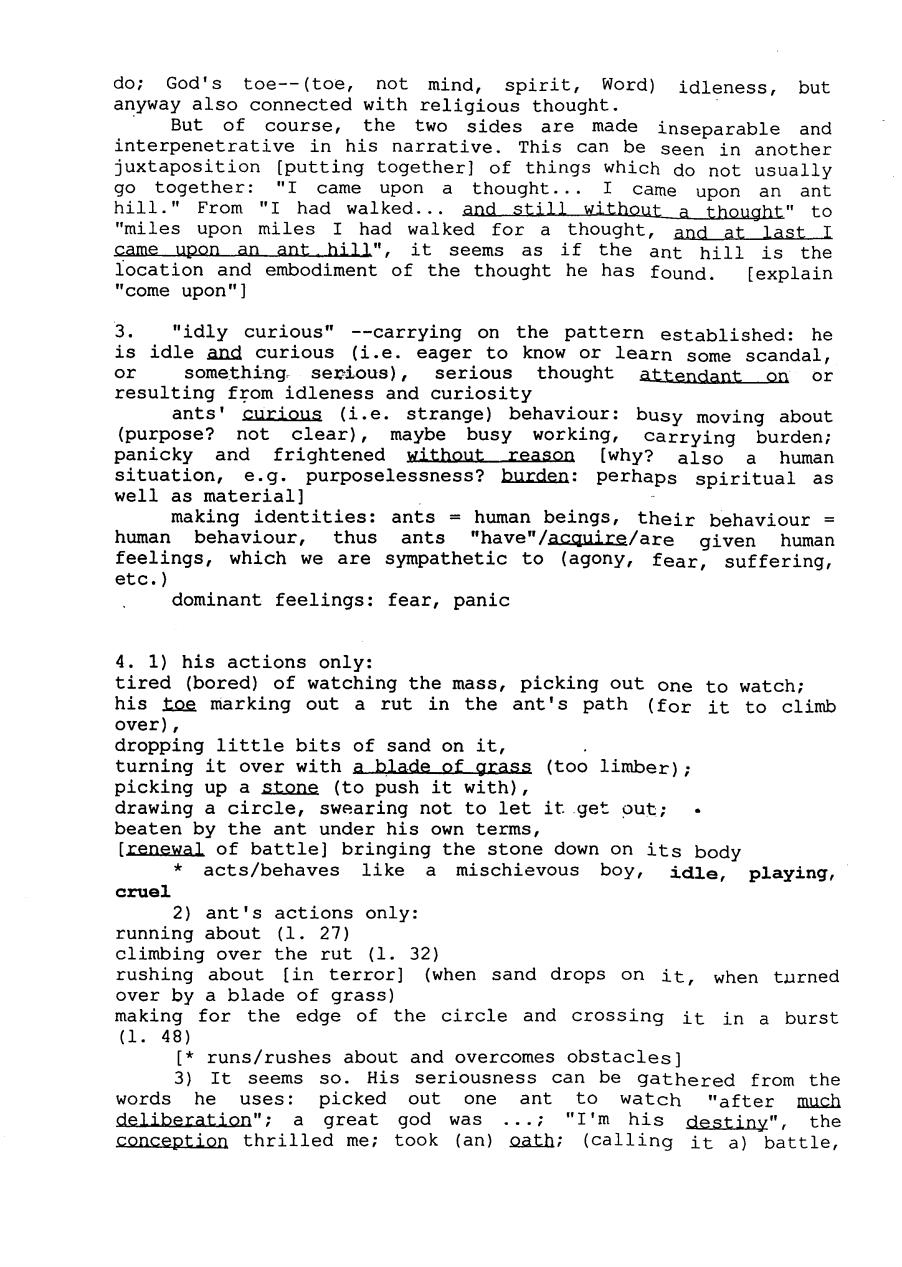
do;God's toe--(toe,not mind,spirit,Word)idleness,but anyway also connected with religious thought. But of course,the two sides are made inseparable and interpenetrative in his narrative.This can be seen in another juxtaposition [putting together]of things which do not usually go together:"I came upon a thought...I came upon an ant hill.From "I had walked...and still without a thought"to "miles upon miles I had walked for a thought,and at last I came upon an ant hill",it seems as if the ant hill is the location and embodiment of the thought he has found.[explain "come upon"] 3. "idly curious"--carrying on the pattern established:he is idle and curious (i.e.eager to know or learn some scandal, or something.serious),serious thought attendant on or resulting from idleness and curiosity ants'curious (i.e.strange)behaviour:busy moving about (purpose?not clear),maybe busy working,carrying burden; panicky and frightened without reason [why?also a human situation,e.g.purposelessness?burden:perhaps spiritual as well as material] making identities:ants human beings,their behaviour human behaviour,thus ants "have"/acquire/are given human feelings,which we are sympathetic to (agony,fear,suffering, etc.) dominant feelings:fear,panic 4.1)his actions only: tired (bored)of watching the mass,picking out one to watch; his toe marking out a rut in the ant's path (for it to climb over), dropping little bits of sand on it, turning it over with a blade of grass (too limber); picking up a stone (to push it with), drawing a circle,swearing not to let it.get out;. beaten by the ant under his own terms, [renewal of battle]bringing the stone down on its body acts/behaves like a mischievous boy,idle, playing, cruel 2)ant's actions only: running about (1.27) climbing over the rut (1.32) rushing about [in terror](when sand drops on it,when turned over by a blade of grass) making for the edge of the circle and crossing it in a burst (1.48) [runs/rushes about and overcomes obstacles] 3)It seems so.His seriousness can be gathered from the words he uses:picked out one ant to watch "after much deliberation";a great god was...;"I'm his destiny",the conception thrilled me;took (an)oath;(calling it a)battle
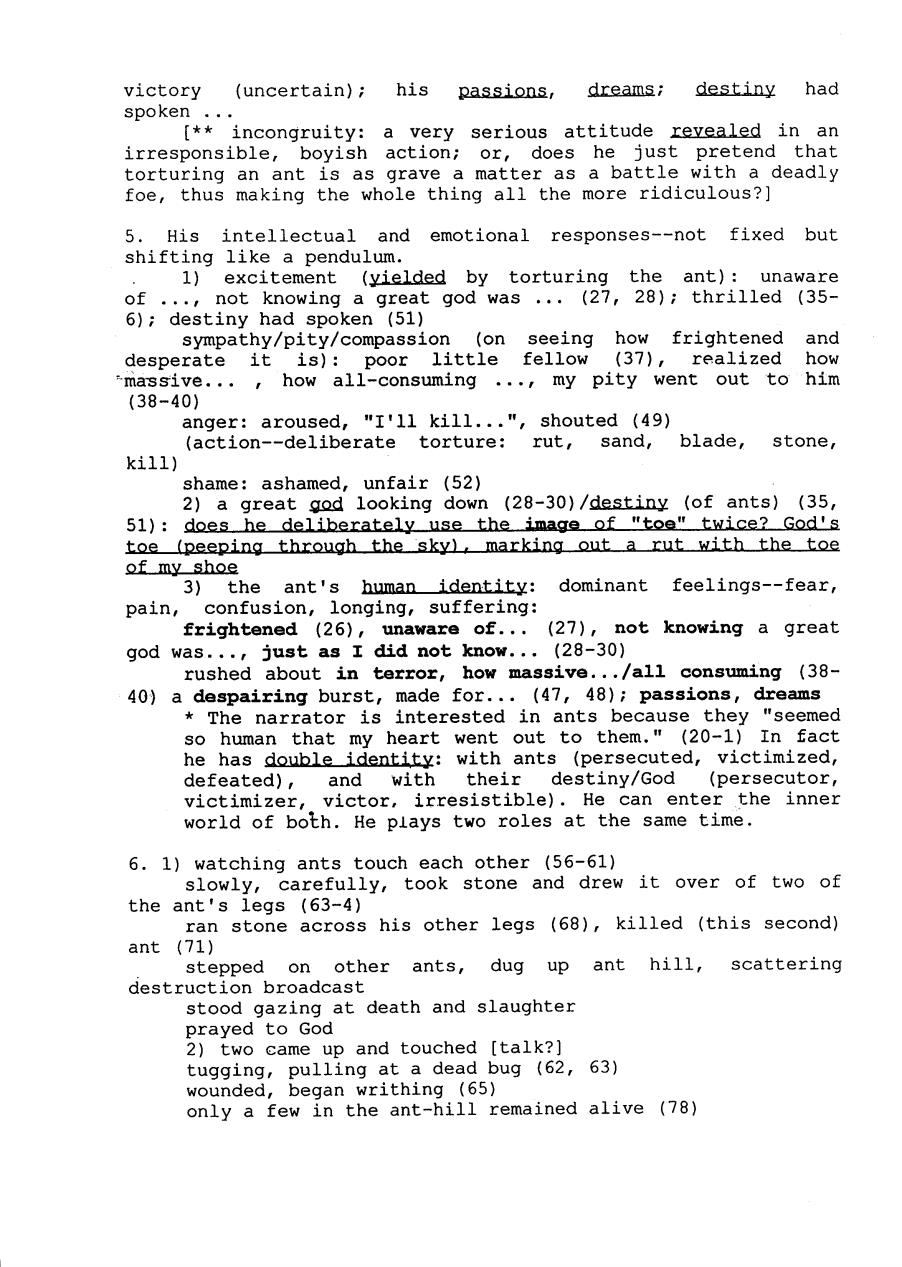
victory (uncertain);his passions, dreams; destiny had spoken... [*incongruity:a very serious attitude revealed in an irresponsible,boyish action;or,does he just pretend that torturing an ant is as grave a matter as a battle with a deadly foe,thus making the whole thing all the more ridiculous?] 5.His intellectual and emotional responses--not fixed but shifting like a pendulum. 1)excitement (yielded by torturing the ant):unaware of ...not knowing a great god was ..(27,28);thrilled (35- 6);destiny had spoken (51) sympathy/pity/compassion (on seeing how frightened and desperate it is):poor little fellow (37),realized how massive...,how all-consuming ...my pity went out to him (38-40) anger:aroused,"I'11 kill...",shouted (49) (action--deliberate torture:rut,sand,blade,stone, ki11) shame:ashamed,unfair (52) 2)a great god looking down (28-30)/destiny (of ants)(35, 51):does he deliberately use the image of "toe"twice?God's toe (peeping through the sky)marking out a rut with the toe of my shoe 3)the ant's human identity:dominant feelings--fear, pain,confusion,longing,suffering: frightened (26),unaware of...(27),not knowing a great god was...,just as I did not know...(28-30) rushed about in terror,how massive.../all consuming (38- 40)a despairing burst,made for...(47,48);passions,dreams The narrator is interested in ants because they "seemed so human that my heart went out to them."(20-1)In fact he has double identity:with ants (persecuted,victimized, defeated),and with their destiny/God (persecutor, victimizer,victor,irresistible).He can enter the inner world of both.He plays two roles at the same time. 6.1)watching ants touch each other (56-61) slowly,carefully,took stone and drew it over of two of the ant's legs (63-4) ran stone across his other legs (68),killed (this second) ant (71) stepped on other ants,dug up ant hill,scattering destruction broadcast stood gazing at death and slaughter prayed to God 2)two came up and touched [talk?] tugging,pulling at a dead bug (62,63) wounded,began writhing (65) only a few in the ant-hill remained alive (78)